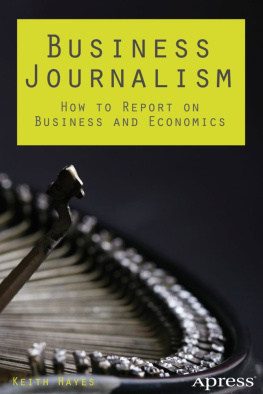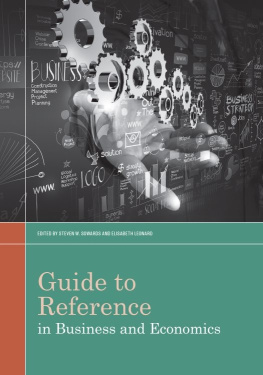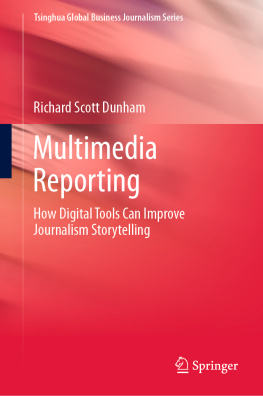Keith Hayes - Business Journalism: How to Report on Business and Economics
Here you can read online Keith Hayes - Business Journalism: How to Report on Business and Economics full text of the book (entire story) in english for free. Download pdf and epub, get meaning, cover and reviews about this ebook. year: 2013, publisher: Apress, genre: Politics. Description of the work, (preface) as well as reviews are available. Best literature library LitArk.com created for fans of good reading and offers a wide selection of genres:
Romance novel
Science fiction
Adventure
Detective
Science
History
Home and family
Prose
Art
Politics
Computer
Non-fiction
Religion
Business
Children
Humor
Choose a favorite category and find really read worthwhile books. Enjoy immersion in the world of imagination, feel the emotions of the characters or learn something new for yourself, make an fascinating discovery.
- Book:Business Journalism: How to Report on Business and Economics
- Author:
- Publisher:Apress
- Genre:
- Year:2013
- Rating:4 / 5
- Favourites:Add to favourites
- Your mark:
Business Journalism: How to Report on Business and Economics: summary, description and annotation
We offer to read an annotation, description, summary or preface (depends on what the author of the book "Business Journalism: How to Report on Business and Economics" wrote himself). If you haven't found the necessary information about the book — write in the comments, we will try to find it.
Business Journalism: How to Report on Business and Economics is a basic guide for journalists working in countries moving to open-market economies, students in journalism courses, journalists changing direction from general news reporting to business and economic reporting, and bloggers. It also explains the differences in technique required for general reporters to deliver business news for text, TV, or radio.
Veteran journalist Keith Hayes, who has worked for such organizations as Reuters, PBS, the BBC, CBC, and CNBC, provides a quick reference to journalistic practice that covers everything from how to meet a deadline to getting answers from company or government officials who would rather not talk. It also provides background on specific knowledge that journalists should have to report on the business and the economy accurately and with insight. That includes understanding the major markets and how they work, learning to read a balance sheet, and getting the story even when a company or government sets up roadblocks.
As Hayes demonstrates, effective journalists are story tellers who need to tell the story well while making certain they are providing the facts as they find them and understand them. Among other things, readers will also learn:
- How to write a business news story
- How to report business news on television
- How to report in a globalized business world
- How to get usable information from press conferences and briefings
- The basics of macroeconomics, the financial markets, and company-specific financial data
- How to dig for facts and get the story
This book covers comprehensively the basics of business and economic reporting. With its insights and tips from Hayes and other veteran journalists, its a book that will remain on your shelf for years to come and help you acquire and cement career-enhancing skills. It will also help you hone your craft as you begin to write more sophisticated stories and take jobs of increasing responsibility.
What youll learn- Good basic journalistic practice
- How to write an effective business news article
- Reporting business for television
- Basics of economic reporting and the importance of the census
- Understanding financial markets and privatization
- Reading and interpreting company accounts
Journalism students; novice journalists; experienced journalists in general news who want to switch to business reporting; and journalists in emerging economies where training opportunities are sparse.
Table of ContentsEstablishing Good Journalistic Practices
Writing an Effective Business News Article
Writing for the Different Business News Media
Establishing Sources of Information
Enterprise Reporting
Ethics and Change
Making Economic Reporting Relevant
Getting the Best from Press Conferences and Briefings
Television Reporting Skills
Reporting on Business for Television
Newswires and their Role
Getting the Pictures
Writing and Reporting for New Media
Macroeconomics
Globalization and Comparisons with Neighboring Economies
Stock and Bond Markets
Markets for Commodities and Exotic Financial Products
Investigating Company Accounts and Assessing the Board
Privatization
SMEs and the Economy
The Importance of a Census
Current Reporting: The Good, The Bad, and
The Ugly
The Pros Speak
Sample Balance Sheet
Keith Hayes: author's other books
Who wrote Business Journalism: How to Report on Business and Economics? Find out the surname, the name of the author of the book and a list of all author's works by series.








